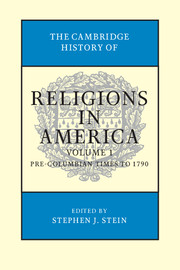Book contents
- Frontmatter
- Contents
- Contributors
- Editor's Introduction
- SECTION I BACKGROUND ON RELIGIOUS TRADITIONS – PRE-1500S
- SECTION II RELIGIONS IN THE POST-COLUMBIAN NEW WORLD – 1500–1680S
- SECTION III RELIGIOUS PATTERNS IN COLONIAL AMERICA – 1680S–1730S
- 12 Spanish Catholicism in the Caribbean, New Spain, and the Northern Frontiers
- 13 French Catholicism in New France
- 14 Congregationalist Hegemony in New England, from the 1680s to the 1730s
- 15 The Middle Colonies, 1680–1730
- 16 Religion in the Southern English Colonies, 1680s–1730s
- SECTION IV RELIGIOUS DIVERSITY IN BRITISH AMERICA – 1730S–1790
- SECTION V AMERICAN RELIGIONS IN THE EIGHTEENTH-CENTURY INTERNATIONAL CONTEXT
- SECTION VI THEMATIC ESSAYS
- Index
- References
13 - French Catholicism in New France
from SECTION III - RELIGIOUS PATTERNS IN COLONIAL AMERICA – 1680S–1730S
Published online by Cambridge University Press: 28 July 2012
- Frontmatter
- Contents
- Contributors
- Editor's Introduction
- SECTION I BACKGROUND ON RELIGIOUS TRADITIONS – PRE-1500S
- SECTION II RELIGIONS IN THE POST-COLUMBIAN NEW WORLD – 1500–1680S
- SECTION III RELIGIOUS PATTERNS IN COLONIAL AMERICA – 1680S–1730S
- 12 Spanish Catholicism in the Caribbean, New Spain, and the Northern Frontiers
- 13 French Catholicism in New France
- 14 Congregationalist Hegemony in New England, from the 1680s to the 1730s
- 15 The Middle Colonies, 1680–1730
- 16 Religion in the Southern English Colonies, 1680s–1730s
- SECTION IV RELIGIOUS DIVERSITY IN BRITISH AMERICA – 1730S–1790
- SECTION V AMERICAN RELIGIONS IN THE EIGHTEENTH-CENTURY INTERNATIONAL CONTEXT
- SECTION VI THEMATIC ESSAYS
- Index
- References
Summary
In New France, the European community consisted of a single body of lay Catholic men and women who were held together, under God's guidance, by the sacraments administered by the clergy. The latter comprised a number of secular priests and the male and female members of the regular orders. The male members of the regular orders were ordained priests who had also pledged themselves to some special vows. In principle, the same description applied in France. The relationship between Church and crown, the role of the Church within the crown, and the crown's obligations toward its Catholic population were the same on both sides of the Atlantic Ocean.
In the early days of French expansion (1608–59), there had been two major differences between France and New France. The most significant one was that the small Catholic community of New France lived side by side with the Indian nations. Although the Indians vastly outnumbered the French, it was then believed that the Indians could become part of the overall Catholic community by way of religious conversion.
Until 1659, the second major difference was the absence of a bishop, that is, a member of the clergy who was not only in a hierarchical superior position, but who also possessed some spiritual faculties that allowed him to administer certain sacraments that simple priests – secular or regular – could not administer, such as the power to ordain new priests or to confirm lay members of the community.
- Type
- Chapter
- Information
- The Cambridge History of Religions in America , pp. 263 - 281Publisher: Cambridge University PressPrint publication year: 2000



